The Soldier's Details

- Surname:
- Wall
- First Name:
- Herbert John
- Nick Name:
- Bert
- Rank:
- Private
- Regimental #:
- WX12989
- Company:
- ‘C’ Company, 12 Platoon
- Enlisted:
- 14.05.1941
- Discharged:
- 31.01.1946
- DOB:
- 13.10.1922
- Place of Birth:
- Dongolocking, Dumbleyung, Western Australia
- Father's Name:
- Roy Henry Wall
- Mothers's Name:
- Elizabeth 'Edith 'Annie Wall (nee McCartney)
- Religion:
- Methodist
- Pre-war Occupation:
- Millhand
- Singapore:
- Selarang Camp Changi
- Force:
- ‘ A’ Force Burma, Green Force, No. 3 Battalion
- Camps Thailand:
- Kanchanaburi, Non Pladuk
- Camps Burma:
- Victoria Point, Tavoy, Ye, Thanbyuzyat, Kendau 4.8km, Thetkaw 14km, Meiloe 75km, Aungganaung 105km, Khonkan 55km
- Camps Japan:
- Sakata
- POW#:
- 1520 & 290
- Japan:
- Rakuyo Maru Party, Kumi No. 35 (rescued by Imperial Japanese Navy)
- Return Details 1945:
- Sakata‐Sendai by train, Sendai‐Yokohama, HMS Wakeful, Yokohama-Okinawa‐Manila by aircraft, Manila‐Sydney, HMS Formidable, Sydney-Melbourne-Adelaide by troop train, Adelaide-Perth by aircraft.
General Description
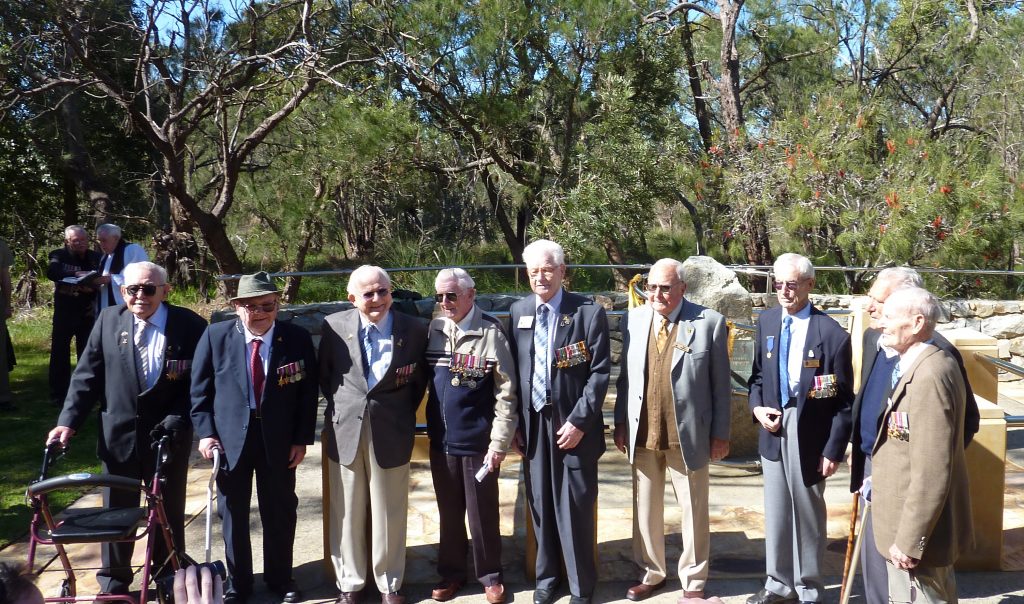
L-R: Kyros, Badock, Jim Elliott, John Gilmour, Bert Wall, Bob Dunnell, Wally Holding, Dick Ridgwell, Alf Worth
‘I had the good fortune to meet Bert Wall on several occasions – I found him to be charming, energetic and a true gentleman. Physically he was quite tall, broad-shouldered and well-built man. He had a twinkle of fun in his eyes! How I wished I could have the chance to know him better.’ (C. Mellor, Secretary, 2012).
Read the story Members of 2/4th nominated for Medal but not awarded.
And the story written by Roy Cornford NX44955 of the 2/19th Battalion.
Bert was a fortunate young man – well fortunate in one way that he survived long enough after the ‘Rakuyo Maru’ sank in South China sea in September 1944 – probably less fortunate than those POWs who were picked up by the American submarines – whereas Bert was picked up by the Japanese. Bert and the other survivors on the Japanese ship received no welcome, care, wash or medical treatment. In fact the POWs were treated appalling on the Japanese naval corvette – they received no water or food. The POWs were mostly naked or near naked and remained so until well after arriving in Japan at their work Camp. There is little doubt their general health was poor, and could have suffered injuries during the sinking or after.
View Peter Winstanley’s video interview of Bert Wall WX12989.
‘Three rafts of POWs were picked up by a Japanese Corvette. The men numbering about 80 or 82 had to climb up the side of the corvette on wire rope (ladder) whilst the ship was moving. They didn’t stop for any man. Fortunately all the POWs managed to climb aboard. The POWs were made to sit on deck up the front. Most had little or no clothing. They were given nothing to drink or eat.
Climie, Syd Clayden and Bert Wall were with this above group. Wall went to Sakata where Rowley Richards was the only Australian Doctor amongst about 40 Australians and 200 British – there were some British doctors. Rowley Richards was regarded very highly as a doctor. In fact Richards worked very hard to save Bert’s life after he took responsibility for theft of a pumpkin froSm the Japanese cook house.
At Sakata he was punished and made to stand without shoes and only in shorts outside the guard house in snow for more than 24 hours. When he was finally told he could go Bert was unable move as his feet were frozen to the ground.
He said the pain he endured outside standing in the snow and slowly freezing to death was unbelievable.
More than 24 hours later he was taken to what was known as the POW Camp Hospital – a smallish room where Rowley Richards and his team worked on Bert giving him a warm bath, rubbing his feet, limbs and body back to life. The Japanese wanted Bert back at work the next day but Rowley Richards said outright Bert couldn’t stand. They found another POW to fill in for him.
The above was taken was from Bert’s words.
His family had given him a small bible, a copy of the New Tastament which Bert managed to keep until the end of the war. He didn’t have much, when he boarded Rakuyo at Singapore he wore only a Jap Happy and the top part of a button up shirt with two pockets into which he placed this precious bible with words written from his father and family and secured it. It survived being in the ocean and the Japanese allowed him to keep it.
On the Rakuyo Bert was in the bottom quarters where the POWs were crammed in and unable to lay down – they sat but had to keep their heads bent on their chests because there simply wasn’t room. Those POWs further upwards could lay down.
Climie and Clayden were sent to Kawasaki Camp 14D.’
Read more on the Donnybrook Boys.
Read Bert’s affidavit relating to the conditions on transport Rakyo Maru WX12989 Wall.
Please read about mates helping each other, Vern Trigwell
Herbert (Bert) John Wall – Recollections of WW2 service
Marched to Thanbuzayat and group were the first Europeans on the line. Freddy Webb, Bert Wall and Vern Trigwell each got a shovelful, went 1,2,3 and threw dirt over their shoulders. They dug trenches and dragged the dirt to make an SOS. Thanbuzayat was a village. The men went to 4 kilo then 13 Kilo Camp named Thetkaw, named after the lizard on the rubber tree.
Lt Cl. Watanabe was in charge and they built the line in 12 months even over dead bodies. The rice was reasonably good as was Thanbuzayat. – 14 kilo camp reasonably good. Thought they were being swapped for POWs.
Shambles! Webb and Wall on artillery gun. They escaped across inlet and joined up with battalion later. Vern was with C Company which was mainly with rifle fire.
Landed and went to Sunset. Then dispersed battalion up until actual fighting. Off Aquatania onto Javanese boats. There was a rumour they were going to India. Captain wasn’t waiting (Malacca Straits). They had cows for company. Australia surrendered 10am 14th. Capitulated the night before. Japs shelling, hit a Chinese chook shed and Vern’s loud voice yelling out, “cut it out, you’re frightening the chooks”. He had jumped on the chook-shed roof. Vern crawled through mangrove swamps to escape Jap fire and when he reached the allied lines, said “Never knew mud was so beautiful!” Vern had been cut off from his group and made his way back alone.
In Changi, went out and to raid ducks.
Bert’s 21st birthday on Railway, he with Webb and others pinched sugar, eggs and maize flour and made cake and took it to the kitchen. He had the ‘day off’ with malaria with aid of Doc Anderson who confirmed Bert was sick with malaria when in fact he had never been sick. Boys including Vern sat on the end of the bed and ate his cake because Bert now was really seriously ill with malaria.
In October 1942 they were at the 105 Kilo camp. Joined up the line near the Three Pagoda Pass. Roughest patches were around 75 Kilo. Last POW card was from 105 Kilo. Then to Kanburi (Harold at Chungkai). There was no option on the Japan Party. Line them up on parade ground in the nuddy. Tested them for Cholera with glass tube. Then to Promproduk. Vern kept pretty well though small, “Shiny little bugger”.
At 14 Kilo had a hill of rock ¼ mile long, 12 ft at the deepest. Hammer and tap levelled with boring rods. Struck Cholera – had to boil all water thereafter.
3 months in Changi then to Vic point by boat and to Tavoy – Tattoo Maru. By truck from Tavoy to Ye and marched from there to Thanbuzayat. Train a few miles before Thanbuzayat. It was a 2 day journey. Marching on ballast on line. Finished laying lines. Teams making ballast broken by hammers, carted rock from quarry half a mile from the line, bamboo and cloth, and bullock carts. Ate bullocks after crashing them. Convinced the Japs the tigers had got them!! Another mob cutting firewood. Freddie Webb went 3 weeks earlier to Tamarkan. The last 48 Vern was amongst them. Aussies worked well together. Laid line, not sleepers. They worked 56 hours without a break as the middle came closer. Worked at night, blokes losing fingers, etc. They used a bamboo fire for working at night. Built all the bridges from teak, blokes towed logs, all piles driven by hand and they used rubber plants for scaffolding. Bert was hit by Japanese and injured his shoulder; Vern had an ulcer but got rid of it. Relationship with coolies ok on the surface but escapees were dobbed in by coolies.
In Saigon fellows were treated poorly. Previously burying 5 or 6 a day, but in Saigon none died. Mieta was OK; the boy bastard caught Bert and tied him to a barbwire fence. When the guard changed, Mieta let him off. He had been there 20 minutes.
When they left Singapore to go to the Japan front, the line soldiers were ok.
All guards Korean.
At 105 Camp Japanese Cpl. always had to be saluted. Georgie was born in Japan but spoke American. Only there 3 weeks. At R.M. had to load own stores. Flour under armpits.
Leaving Changi robbed boots but all left feet and no rights. Feb 42, long time before fed in Changi. Cameron requested all supplies to be handed in. One day just hard biscuit dunked in water.
On R.M. all POWs had life jackets. Bert felt explosion, felt as though went to the bottom of the sea. Some of the boys saw the torpedoes coming. Others could hear it. Bert had to get everyone out of the hold. The R.M. lurched and stopped. Bert and Ross Dunbar waited to see all was clear then went over. Blokes threw over planks from the hold, hit Campbell. Bert went back to boat and found a kerosine tin all got a drink at least.
Baggs composed a poem about how Harry Cain was KIA. Baggs had an enormous collection of his own poetry, sadly it was all lost when Rakuyo sank.
Baggs had been learning to play violion with a tutor. Jimmie Baggs had a beautiful voice.
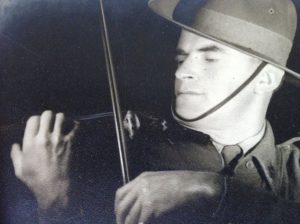
Bert was on a raft, or rather swimming and managed to get himself onto a disbanded lifeboat. (A Japanese corvette picked up about 80 POWs in 3 lifeboats). (They came across Varley & his lot) heading for the shipping lanes. (Bert with Duncan’s 3 rafts) headed with Duncan’s lot in another direction.
Pinched a pumpkin, was beaten and stood in snow for 24 hours wearing only shorts. Bert was frozen into ground. Till 6.30pm to bend one joint. Had no voice for 3 months. There were further beatings. Coughed up and had to wait for 10am parade. All had pneumonia. One guy died and Bert passed out for 15 days. When he woke up the room was empty, they had all died. His mates checking on him every night were betting on him dying and living! As they did! It was Dr. Rowley Richards and his orderlies looking after Bert.
R.M. – Rakuyo Maru
(Please note the above has not been edited – there may be some anomalies.)
At Victoria Point aerodrome he with Harry Fuhrmann and one other 2/4th decided they would try to escape. They informed their officers and arrangements were agreed to that the three would return at night if unsuccessful and/or they changed their mind. Well the group of three did change their mind after a day out in the jungle. The Camp had already had the evening Parade, but this was overcome when the officers said the men had been with a work party and returned late.
They were lucky, because it was at Victoria Point where a 2/4th Robert Goulden was executed for attempting to escape.
Height 5′ 9″
When Bert was freed in Japan he weighed 5 stone 12 lbs.
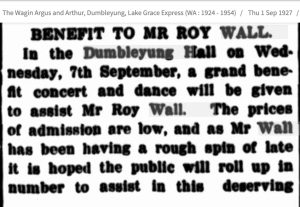
Below: Bert’s mother Ednid Wall died in Nov 1928 aged 33 years.
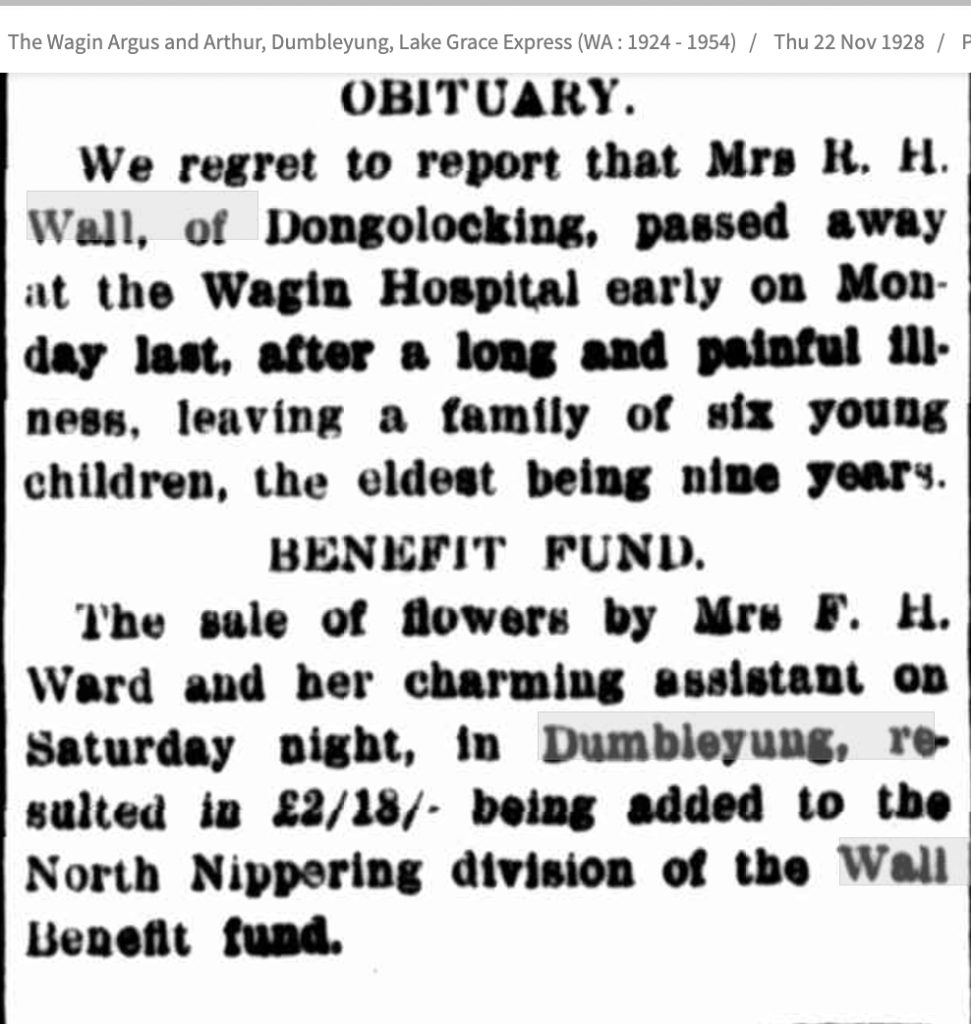
Bert was the fifth child born 1922 Dongolocking, Dumbleyung to parents Roy Henry and Edith Annie Wall (nee McCartney). They were both SA born and married in SA 1917. Bert was 6 years old when his mother died of breast cancer in Wagin November 1928 aged 33 years. Soon after his father’s farm was declared bankrupt, Roy Wall went away to work on road construction and the children were sent to Roy’s brother where they shared pretty basic accommodation with 6 cousins.
He had started school aged 5 years as the government would only fund schools with a minimum of 9 children. It was not uncommon for families to top of the necessary numbers with younger children. After a few years Roy Wall was able to purchase a share farm about 8 miles from Kirup and moved there with his children. At about 13 years of age Bert left home on foot. He got a job with a blacksmith (who obviously never asked Bert’s age) he was paid one Pound weekly and food to drive a team of horses, and tree blasting. His boss then discovered his age after five months and Bert left.
He was at the local store when it was mentioned somebody was looking for labour I believe in Donnybrook. Bert climbed aboard the local creamery truck and eventually found the farmer. He got the job of milking 75 cows (the position held previously by Wally Trigwell) in the morning and night seven days a week, and work in the fruit Packing Shed during the day.
The boss discovered Bert could break-in horses (whether he could or couldn’t, that was what Bert told him) so he was offered one Pound 25 shillings to do so. He was then 14 and about to turn 15. Bert told his boss and workmates and he received his first birthday present ever! Shirt and trousers.
Bert had joined the 20th Light Horse Militia in Donnybrook and was a machine gunner.
He decided he would join the Army 14 May 1942 at Donnybrook. He put his age up two years . He was 18 however he wanted to be sure to be accepted. He was sent to Northam where he was selected to attend Intelligence training. Bert didn’t enjoy this and asked to be transferred back to the machine gun battalion. He was then selected to attend an Officers Course in Melbourne with Ransome, Ambrose and was one of 20 men. Meanwhile the war arrived and at that time 8 or 9 of the men were still in training class, however they were immediately ordered back to WA to go on pre-embarkation leave before joining the ‘Aquitania’ on 15 January 1942. He joined ‘C’ Company 12 Platoon.
Following the fighting and surrender in Singapore, Bert left with the first work party to work at the south-west coast of Burma before starting on the Burma end of Burma-Thai Railway. Please read about ‘A’ Force Burma Green Force No. 3 Battalion.
After the war, Bert took up hairdressing profession.
Bert married Mavis Madeline Truslove in 1946. The couple had two children.
Bert’s father died in 1983.
He had enlisted WW1 in SA. He suffered with Haematuria (blood in Urine) and several times was hospitalised in Cario. Initially he joined 9th L/Horse however was transferred to 3rd Australian Machine Gun Squadron – serving in the Middle East. He was repatriated in 9 Jan 1919.
Bert died 21 Jan 2012 aged 89 years.
Below: Bert’s father Roy Wall’s discharge WW1. He served with 3rd Machine Gun Squadron.
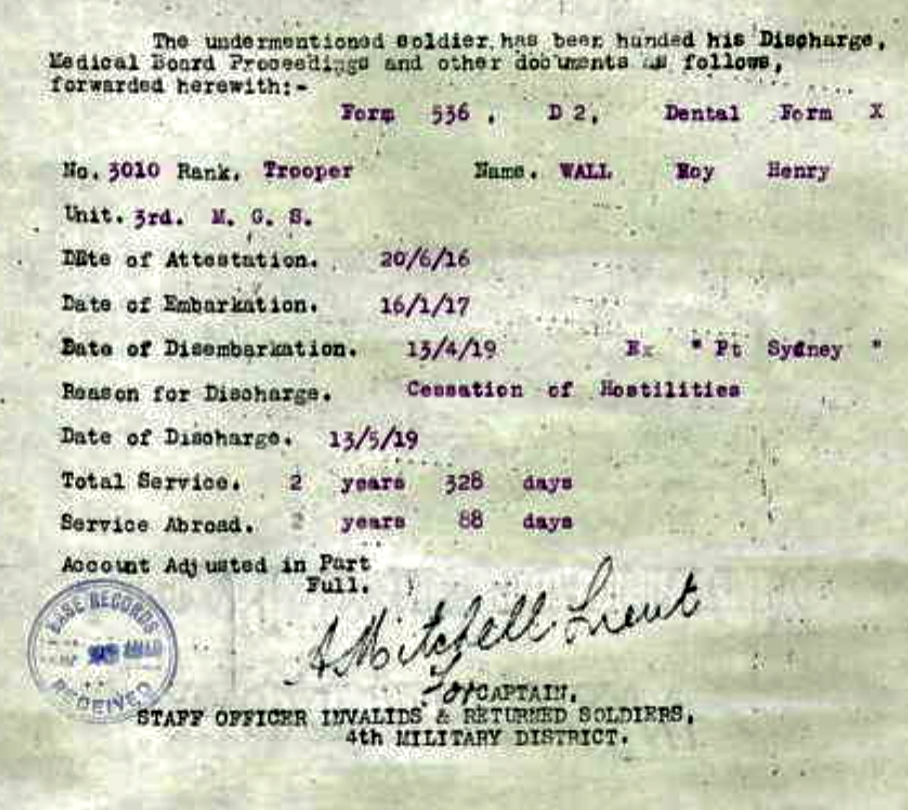
Below: Edith’s father John McCartney served 15 months prison.

John McCartney enlisted WW1 stating his age was 44 years, however it is believed he was at least 50 years old. He travelled as far as England with AIF however was sent back to Australia and discharged 1917 the reason provided was senility.
McCartney died in 1924 Adelaide.
Camp Locations:
- Selarang Barracks Changi - Singapore
- Selarang Camp Changi - Singapore
- Kanchanaburi, 50k - Thailand
- Non Pladuk, 0k - Thailand
- Aungganaung,105Kilo - Burma
- Kendau, Kandaw, 4 Kilo - Burma
- Khonkan, 55Kilo Hospital 360k - Burma
- Meilo, 75 Kilo, 340k - Burma
- Tavoy (Dawei) - river port - Burma
- Thanbyuzayat, 415k - Burma
- Ye - Burma
- Saigon - French Indo China
- Sakata, Sendai #9-B - Japan
- Victoria Point, Kawthoung - Burma. \'A\' Force, Green Force No. 3 Btn
- Thetkaw 14 Kilo - Burma





